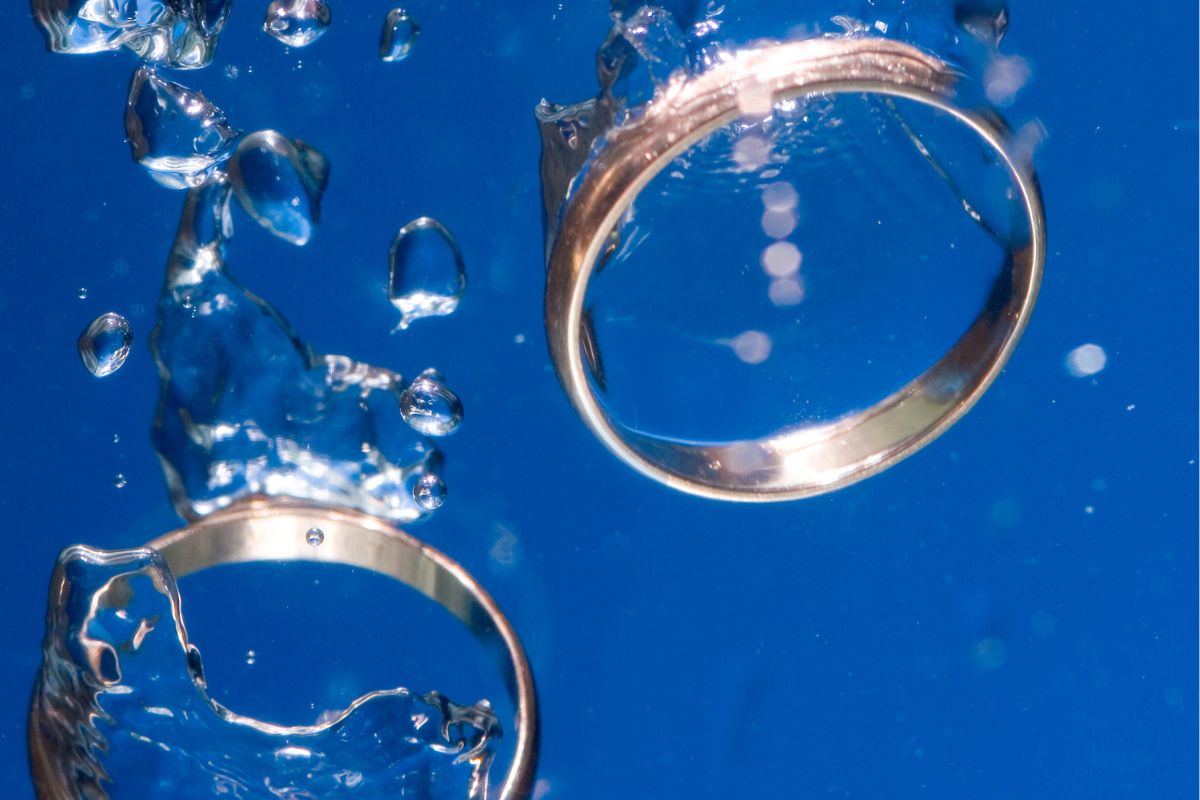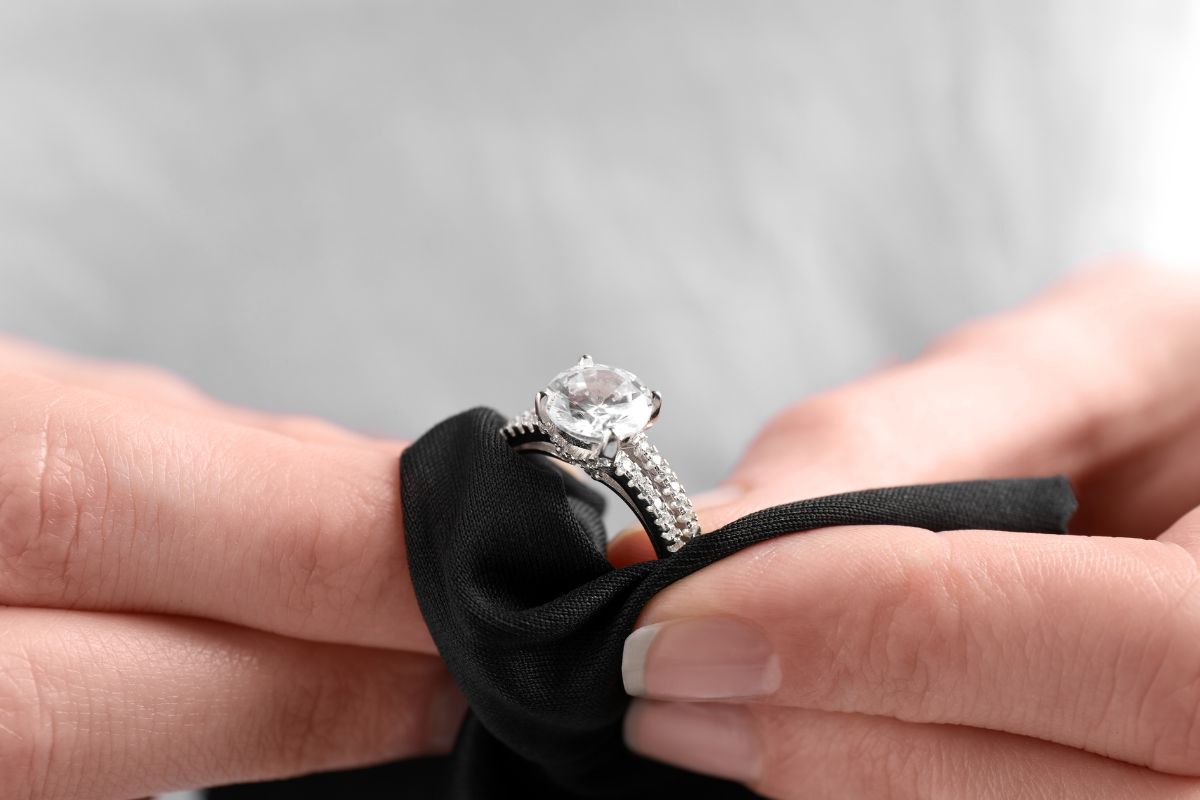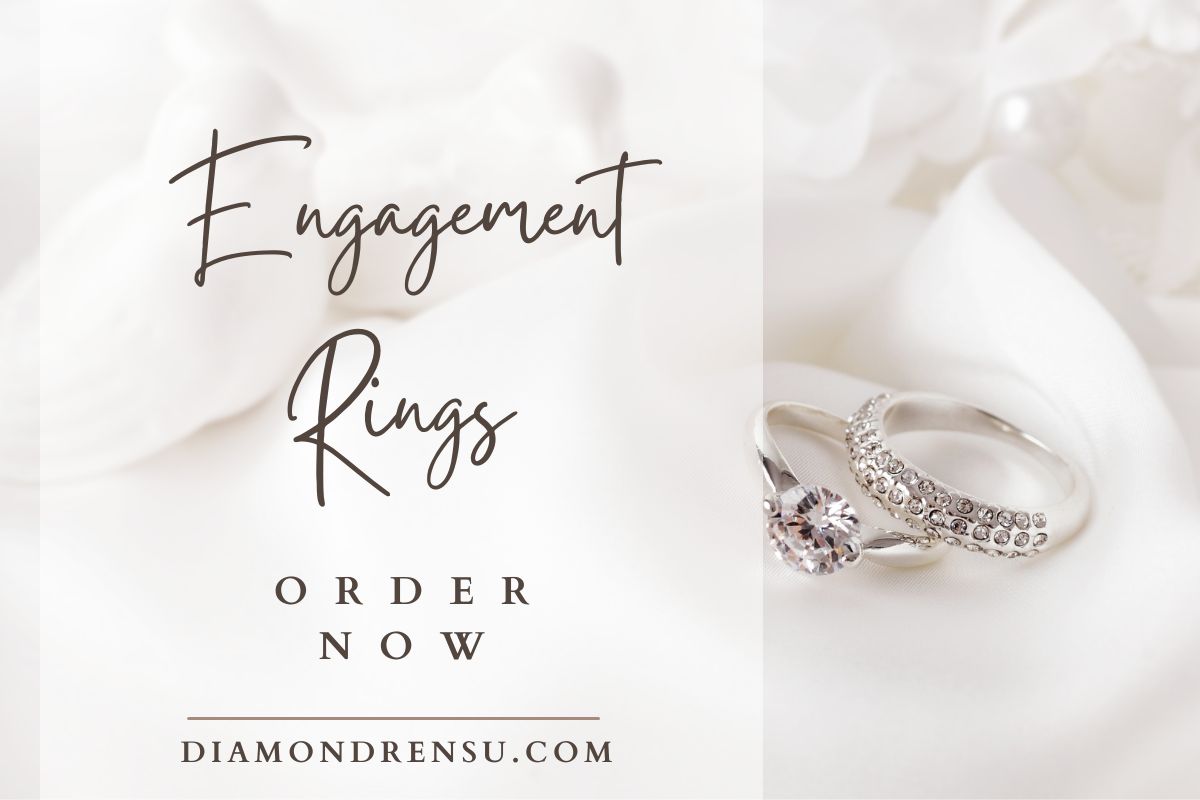
Can I Wear My Engagement Ring in the Pool: Risks and Precautions
Wearing your engagement ring in the pool exposes it to risks that many are not aware of. The most common issue is the potential damage that can occur from the chlorine and other chemicals in pool water. These substances can react with the metal of your ring, leading to discoloration and structural damage over time. Additionally, the cold water of pools can cause your fingers to shrink slightly, which might result in your ring slipping off without you noticing until it's too late.

If your engagement ring has a significant amount of nickel in the alloy, or if the setting includes prongs, these features are particularly susceptible to the effects of regular exposure to pool chemicals. The issue doesn't just lie in possible tarnishing or discoloration; there's also a chance that chlorine and other pool chemicals can weaken the ring's structure. This could lead to loosening of the stone and increase the chance of losing it, a scenario no one wants to experience with such a cherished item.
The implications of wearing your engagement ring in the pool go beyond its immediate effects. Over time, continual exposure to harsh pool chemicals can accelerate wear and tear, not only diminishing the ring's beauty but also potentially incurring extra costs in repairs or replacement. Therefore, it's crucial to consider these factors and evaluate the risks before deciding to keep your engagement ring on during a swim.
Understanding Your Engagement Ring
When considering the makeup of your engagement ring, it’s vital to acknowledge the different materials and design elements that can be affected by various conditions, such as immersion in pool water.
Metals: Common metals used in engagement rings include gold, platinum, and rose gold. Gold, whether yellow, white, or rose, typically contains other alloys such as copper or nickel. Platinum is a durable and corrosion-resistant metal, often preferred for its longevity.
Precious Metals and Reactions: Some metals, like gold with higher alloy content or rose gold, which includes copper for its pink hue, may be more susceptible to discoloration from pool chemicals like chlorine. Nickel, an alloy in some gold rings, may also react adversely over time with repeated exposure to harsh conditions.
Risk of Loss: Rings can slip off in water due to reduced finger size.
Damage Potential: Chlorine and pool chemicals can tarnish or erode metal settings.
Prong Damage: Harsh pool surfaces can bend or break delicate prongs holding gemstones.
Gemstone Safety: Gemstones can become loose or fall out during pool activities.
Water Retention: Trapped water under rings can lead to skin irritation or infections.
Temperature Changes: Rapid temperature changes in pools can cause metal expansion or contraction.
Sunscreen Residue: Sunscreen chemicals can dull or discolor ring surfaces over time.

Gemstones: While diamonds are renowned for their durability, other gemstones such as pearl, lapis lazuli, and turquoise are more vulnerable and can be damaged by chemicals found in pools. Pearls especially can lose their luster, and softer stones may experience surface etching.
Settings and Soldered Parts: The prongs, which hold gemstones in place, can become loose over time, and the risk heightens with exposure to chemicals or physical activity, potentially resulting in stone loss. Furthermore, soldered joints can weaken, posing a threat to ring integrity especially where intricate work is involved.
Integrity: It’s essential to remember that the physical integrity of your ring, whether it's the durability of the metal or the secure fit of the stones, might be compromised over repeated exposure or due to pre-existing wear and tear. Thus, you may want to avoid wearing your engagement ring in the pool to maintain its condition.
Risks of Wearing Rings in Pools

When you take a dip in the pool with your engagement ring on, you expose it to risks that may affect its appearance, structure, and the likelihood of retaining it on your finger.
Chemical Exposure
Chlorine and other harsh chemicals found in pool water can lead to discoloration and tarnishing of the metal on your ring. Over time, exposure to these chemicals may weaken the structure, potentially leading to a loose setting.
Physical Damage
Swimming can expose your ring to physical stresses. Unexpected contact with hard surfaces can result in dents and scratches, especially on rings made with soft metal settings or featuring natural stones that are not as hard as diamonds on the Mohs scale.
Risk of Loss
Cold water may cause your fingers to shrink, increasing the chance of your ring slipping off and disappearing in the pool. Additionally, if the setting is already loose, the likelihood of a stone falling out becomes greater.
Water and Metal Interaction

Water damage is not limited to chlorinated pools; saltwater pools can also cause harm. Both types of pools can induce corrosion over time, especially to metals that are less resistant to saltwater.
Effects on Stone Settings
Repeated submersion in water can have a deteriorating effect on the prongs that hold gemstones in place. Chlorine, in particular, may corrode the setting, leading to a loose diamond or stone.
Temperature and Ring Safety

Temperature changes as you enter and exit the pool may influence the tightness of the ring on your finger and metal reactivity. Extremely cold water can temporarily reduce finger size, posing a slip-off risk.
Other Contaminants
Apart from chlorine, rings encounter oils, lotions, sunscreen, and even bug sprays while swimming. These substances can create a film that attracts dirt and may necessitate professional cleaning to restore the ring's original luster.
Proper Care for Engagement Rings

Proper care ensures that your engagement ring remains in pristine condition, retains its sparkle, and lasts long into the future. Attention to cleaning, storage, and regular maintenance will protect its shine as though it's still brand new.
Cleaning Recommendations
Clean your engagement ring every few weeks to maintain its brightness. Prepare a solution with warm water and mild soap. Use a soft brush, such as a toothbrush, to gently remove any film or buildup from the ring. After cleaning, rinse the ring in warm water and pat dry with a soft, lint-free cloth.
Safe Storage Solutions
When not wearing your ring, store it in a jewelry box or a secure place. If you're involved in physical activity or going to bed, place your ring in a soft bag or a waterproof pouch to guard against scratches or impact. Always store your engagement ring away from other jewelry to prevent scratches.

Maintenance and Inspection
| Task | Frequency | Procedure |
|---|---|---|
| Cleaning | Weekly | Use a soft brush and mild soap to clean the ring, or take it to a jeweler for professional cleaning. |
| Inspection | Monthly | Check for loose stones, damaged prongs, or signs of wear. Take it to a jeweler for repairs if necessary. |
| Storage | When not worn | Store the ring in a soft pouch or jewelry box to prevent scratches and minimize exposure to air and moisture. |
Regularly inspect your ring for any loose prongs or settings that might affect your gemstones or diamonds. If you find any loose elements, take it to a professional jeweler for immediate repair to prevent loss or damage to the stones. Err on the side of caution and have your ring inspected by a professional jeweler once a year.
Avoiding Ring Damage
Be mindful of activities that might damage your ring. It's wise to remove your ring during physical activity that can exert unnecessary pressure on it. Avoid exposing your ring to harsh chemicals, such as those found in pools, which can deteriorate the metal and dull the finish.
Engagement Ring Longevity
To maintain the longevity and condition of your engagement ring, err on the side of caution. Remove your engagement ring during activities that might expose it to harsh substances or physical harm. Treating your ring with care will ensure it stays looking new for years to come.
Frequently Asked Questions
When it comes to engagement rings, protective measures are key. Understand the risks and best practices to ensure your ring’s longevity and sparkle.
Q: Is it safe to wear my engagement ring in the shower?
While showering with your engagement ring on occasionally may not cause immediate damage, frequent exposure to soap and water can lead to the buildup of residue, which can dull the sparkle of your gemstone and may lead to more serious damage over time.
Q: Does exposure to chlorine in swimming pools pose a risk to my engagement ring?
Chlorine in swimming pools can react negatively with the metals in your engagement ring, potentially leading to discoloration and structural damage over time. It's best to remove your ring before entering a chlorinated pool.
Q: Can exposure to ocean water damage my engagement ring?
Saltwater can be corrosive, and exposure to ocean water should be avoided. Sand can scratch the metal and stones. The risk of losing your ring is also higher due to your fingers contracting in cold water, which can cause a loose fit.
Q: Is it advisable to remove my engagement ring before going to bed?
Removing your engagement ring before sleeping prevents potential snagging on fabrics and pressure on the setting which, over time, could cause the setting to warp or the stone to loosen.
Q: What precautions should I take with my engagement ring at the nail salon?
Chemicals in nail polish and acetone-based removers can dull the finish of your engagement ring or even damage certain gemstones. Consider removing your ring before any nail treatment to keep it unaffected.
Q: Should I take off my engagement ring once I am married?
This is a personal preference. Some choose to wear their engagement rings daily, while others reserve them for special occasions. However, when active or using harsh chemicals, it's advised to remove it to prevent damage.
Checkout some of our top collections:
Leave a comment
Please note, comments must be approved before they are published.










